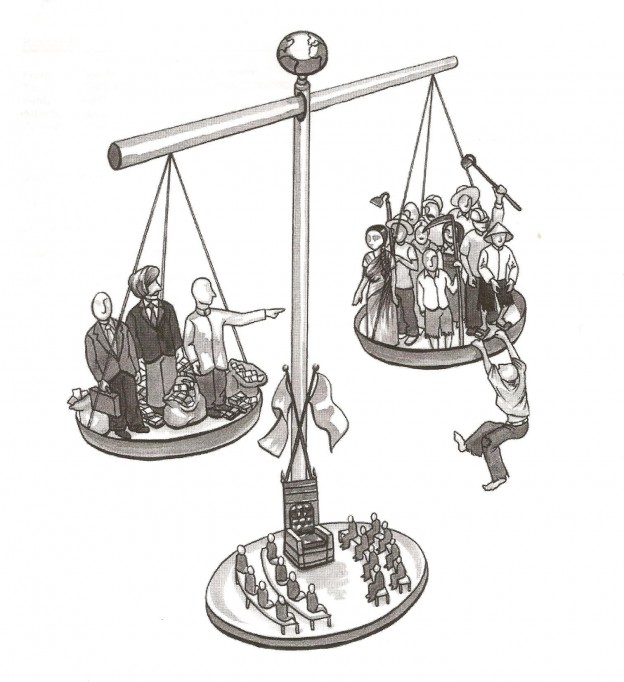Of society’s three potential steering mechanisms, market and state have each proved disastrous as the preponderant principle for allocating resources, production and power. The closer societies approximate the self-regulating market system, the steeper the costs. We see those costs today in the form of high inequality and insecure jobs, environmental destruction, economic volatility in the form of periodic booms and busts, the dilution of democracy, and the rise of right-wing populism in a context of widespread anger. The directive state, in the form of bureaucratic collectivism (communism and state socialisms), state capitalism and top-down social democracy, has also proved defective. The dominant state has, at the least, stifled civil society and market forces with its paternalistic embrace; at its worse, it has fostered a new class within a totalitarian system. Where do we look for a progressive alternative? Continue reading
Category Archives: Strategies
An “In-Between” Progressive Strategy: Beyond Socialism versus Social Democracy
With the parties of the democratic left in Europe in free-fall, with the receding of the ‘Pink Tide’ in Latin America and with the widespread rise of far-right populism, a shift in progressive strategy is past due. Continue reading

Towards This Generation’s New Left
Every generation develops its own New Left. This is a natural process as proponents struggle to come to grips with new challenges and old failures. Continue reading
Is Canada’s ‘Leap Manifesto’ Too Radical?
The press attacks on the LeapManifesto when it was considered by the New Democratic Party piqued my interest. “A Hard Left Turn to Nowhere,” thundered the National Post. Barrie McKenna of the Globe & Mail proclaimed that “The Leap Manifesto is a Prescription for Ruin.” Macleans lamented “How to Kill the NDP.” Some columnists concluded that the “loony left” had captured the party (even though the party had not endorsed the manifesto). What is all the fuss about? Continue reading
Interview with Richard Sandbrook on Reinventing the Left

Ali Burak Guven (ABG): What was your motivation for writing Reinventing the Left?
To be honest, I never set out to write such an ambitious book. I originally conceived the project as a critique of neoliberal development doctrine. But one thing led to another, and my inclination to move beyond critique to the central question of “what might be done” came to the fore. This, to my mind, raised the issue of the viability and promise of the democratic left. Continue reading
The Left’s Central Dilemma
Sometimes it appears that the democratic left is engaged in the labour of Sisyphus. Sisyphus, according to the Greek myth, was condemned by the gods to spend eternity in an utterly futile task: to push a boulder to the top of a hill, only to see it roll down to the bottom each time. Leaders of the left have their own peculiar burden to shoulder. When progressive parties pursue a moderate strategy of accommodation with capitalism, they may achieve egalitarian gains but rarely enough to satisfy their militant followers. But if they pursue a more confrontational stance vis-à-vis inherited structures of privilege and power, they risk instigating an economic crisis that may usher in a crushing political crisis as well. This pattern is evident in the Global South, the focus of this post, but it probably applies also to the Global North. Continue reading
Can Moderate Social Democracy be Progressive? A View from the Global South
![]() Progressive movements divide into two types. On the one hand, there are leftist parties with a moderate strategy that aim, or at least resign themselves, to implement redistributive programs with the acquiescence of the elites. On the other hand, we find parties that believe that only unrelenting confrontation of existing power structures and inherited privilege will bring the desired results. The division between class compromise and class struggle is fundamental. Continue reading
Progressive movements divide into two types. On the one hand, there are leftist parties with a moderate strategy that aim, or at least resign themselves, to implement redistributive programs with the acquiescence of the elites. On the other hand, we find parties that believe that only unrelenting confrontation of existing power structures and inherited privilege will bring the desired results. The division between class compromise and class struggle is fundamental. Continue reading

Left Populism: An Alternative to Neoliberalism?
Left populism has recently emerged as a political response to growing inequality, persistent poverty and the dominance of neoliberal doctrine. It dates from the early 2000s, with varying strains in Eastern and Central Europe, the “Bolivarian Revolution” of Hugo Chávez and Nicolas Madura in Venezuela since 1999 and somewhat similar regimes in contemporary Ecuador and Bolivia. In Reinventing the Left in the Global South, I deal with the last three cases in detail.
is left populism just old-style populism in new clothes, or is it a new and genuine alternative to neoliberalism? Continue reading
The Viability of a Radical Social-Democratic Path
Socialism in the twentieth century generally collapsed or devolved into an authoritarian bureaucratic collectivism. Have any recent movements in the Global South found a way of avoiding these dead-ends? One possibility is the radical social-democratic strategy of socialist transition; but comparative analysis suggests it is a risky, turbulent venture whose success depends upon unusual conditions. Continue reading

What is social democracy?
Social democracy is one of the vaguest terms in the political vocabulary, yet it refers to a regime of considerable importance. Originally, social democrats were socialists who thought the surest path to societal transformation in emergent liberal democracies lay in building popular support through competitive party politics and social-movement organization. Since the 1960s and 1970s, however, social democrats have dropped references to socialist goals in favour of promoting a progressive, domesticated form of capitalism. But what precisely does this latter goal entail? Today, “socialist” parties in competitive party systems often have platforms that suggest a social-democratic orientation, whereas parties labelled “social-democratic” or “labour” pursue policies little different from those of the neoliberals. How can we resolve this definitional riddle? Continue reading